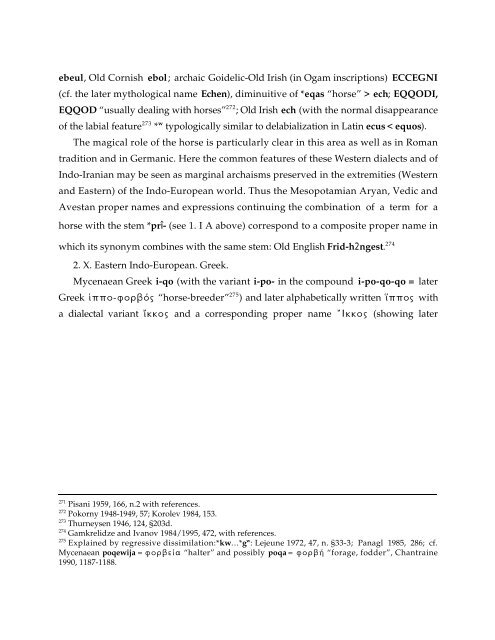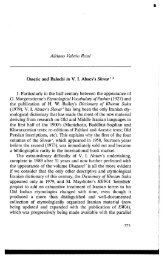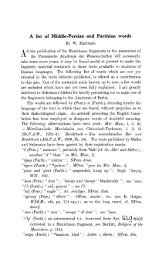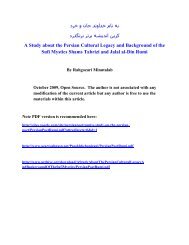Comparative Notes on Hurro-Urartian, Northern Caucasian
Comparative Notes on Hurro-Urartian, Northern Caucasian
Comparative Notes on Hurro-Urartian, Northern Caucasian
You also want an ePaper? Increase the reach of your titles
YUMPU automatically turns print PDFs into web optimized ePapers that Google loves.
ebeul, Old Cornish ebol; archaic Goidelic-Old Irish (in Ogam inscripti<strong>on</strong>s) ECCEGNI<br />
(cf. the later mythological name Echen), diminuitive of *eqas “horse” > ech; EQQODI,<br />
EQQOD “usually dealing with horses” 272 ; Old Irish ech (with the normal disappearance<br />
of the labial feature 273 * w typologically similar to delabializati<strong>on</strong> in Latin ecus < equos).<br />
The magical role of the horse is particularly clear in this area as well as in Roman<br />
traditi<strong>on</strong> and in Germanic. Here the comm<strong>on</strong> features of these Western dialects and of<br />
Indo-Iranian may be seen as marginal archaisms preserved in the extremities (Western<br />
and Eastern) of the Indo-European world. Thus the Mesopotamian Aryan, Vedic and<br />
Avestan proper names and expressi<strong>on</strong>s c<strong>on</strong>tinuing the combinati<strong>on</strong> of a term for a<br />
horse with the stem *prî- (see 1. I A above) corresp<strong>on</strong>d to a composite proper name in<br />
which its syn<strong>on</strong>ym combines with the same stem: Old English Frid-h2ngest. 274<br />
2. X. Eastern Indo-European. Greek.<br />
Mycenaean Greek i-qo (with the variant i-po- in the compound i-po-qo-qo = later<br />
Greek flppo-forbÒw “horse-breeder” 275 ) and later alphabetically written ·ppow with<br />
a dialectal variant ‡kkow and a corresp<strong>on</strong>ding proper name ÖIkkow (showing later<br />
271 Pisani 1959, 166, n.2 with references.<br />
272 Pokorny 1948-1949, 57; Korolev 1984, 153.<br />
273 Thurneysen 1946, 124, §203d.<br />
274 Gamkrelidze and Ivanov 1984/1995, 472, with references.<br />
275 Explained by regressive dissimilati<strong>on</strong>:*kw…*g w : Lejeune 1972, 47, n. §33-3; Panagl 1985, 286; cf.<br />
Mycenaean poqewija = forbe¤a “halter” and possibly poqa = forbÆ “forage, fodder”, Chantraine<br />
1990, 1187-1188.





